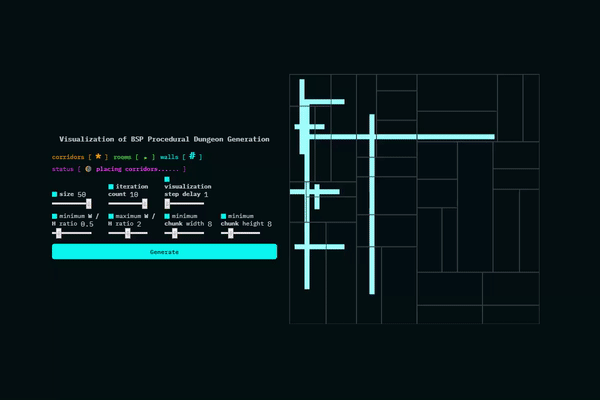dungrain
v0.1.6
Published
BSP based procedural dungeon generation package.
Downloads
1
Maintainers
Readme

dungrain 
dungrain is a procedural dungeon generation library that was built on binary space partitioning method. It takes some arguments as an object and creates 2D number array that contains types of tiles that placed based on indexMap (Wall, Path, Room, Empty) values.
installation
You can directly use dungrain.js or dungrain.min.js file with script tag. They can be found in build folder at github repo.
<script src="./build/dungrain.min.js"></script>
<script>
let dungeon = new dungrain({
iterationCount: 20,
column: 100,
row: 40,
indexMap: {
Wall: 3,
Path: 2,
Room: 1,
Empty: 0
}
});
</script>or you can install with npm.
npm install dungrainconst dungrain = require('dungrain');
let dungeon = new dungrain({
iterationCount: 20,
column: 100,
row: 40,
indexMap: {
Wall: 3,
Path: 2,
Room: 1,
Empty: 0
}
});usage
arguments
All arguments have to be passed into class as an object.
{
iterationCount: number,
column: number,
row: number,
indexMap: {
Wall: number,
Path: number,
Room: number,
Empty: number
}
seed: string (optional) (default: it will be generated randomly),
minimumWHRatio: number (optional) (default: 0.5),
maximumWHRatio: number (optional) (default: 2.0),
minimumChunkWidth: number (optional) (default: 8),
minimumChunkHeight: number (optional) (default: 8)
} methods
getMap() // (returns generated dungeon that formed into 2D number array)
getAllFloors() // (returns all available floors included rooms and paths)
getRooms() // (returns all room objects that contains their topleftcorner point and all available floors array)
getPaths() // (returns all path objects that contains their start point, all available floors array data, direction data (0: VERTICAL, 1: HORIZONTAL) and width value (represents the length of the path))
getSeed() // (returns the seed of the generated dungeon)example
code
<canvas class="canvas" width="1000" height="500"></canvas>
<script src="./build/dungrain.min.js"></script>
<script>
let canvas = document.querySelector('.canvas');
let ctx = canvas.getContext('2d');
let dungeon = new dungrain({
seed: 'example',
iterationCount: 6,
column: 100,
row: 50,
indexMap: {
Wall: 3,
Path: 2,
Room: 1,
Empty: 0
},
minimumWHRatio: 0.8,
maximumWHRatio: 1.6,
minimumChunkWidth: 2,
minimumChunkHeight: 2
});
let map = dungeon.getMap();
for (let i = 0; i < map.length; i++) {
for (let j = 0; j < map[i].length; j++) {
let tile = map[i][j];
if (tile == dungeon.indexMap.Wall) {
ctx.fillStyle = 'black';
} else if (tile == dungeon.indexMap.Path) {
ctx.fillStyle = 'blue';
} else if (tile == dungeon.indexMap.Room) {
ctx.fillStyle = 'green';
} else {
ctx.fillStyle = 'white';
}
ctx.fillRect(j * 10, i * 10, 10, 10);
}
}
</script>output

see in action @codepen
i made a codepen visualization demo with early version of this. You can play with that from here: https://codepen.io/omercanbalandi/pen/JjoeKrQ

